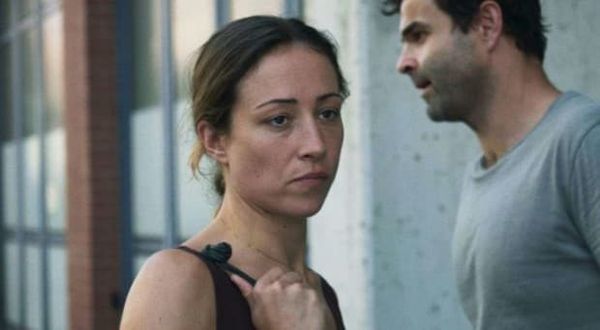Eye For Film >> Movies >> All Is Well (2018) Film Review
All Is Well
Reviewed by: Amber Wilkinson

Often when rape is considered by movies, it arrives as an act of extreme violence with immediately crushing consequences that permit little room for anything else in its wake. Lately, there have been signs this is changing, with the likes of Paul Verhoeven's Elle daring to offer a more complex psychological picture of what a woman might be 'permitted' to do following an attack. Here, Eva Trobisch, in a remarkably restrained debut, also subtly dismantles stereotypes and expectations, showing how it's possible for a sexual assault to arrive with little warning or fanfare and be quietly devastating in its aftermath.
Janne (Aenne Schwarz, a name to look out for) is presented to us in a series of easy and relaxed encounters, giving us a sense of life with her boyfriend Piet (Andreas Döhler). Trobisch takes a show rather than tell approach to their relationship, capturing it through small gestures and moments rather than piling up the dialogue.

Financial problems are leading them to make preparations for a new life in the countryside until a chance encounter with an old friend, Robert (Tilo Nest), as she heads to a school reunion, opens up a job prospect Janne hadn't imagined. He also introduces her to his brother-in-law Martin (Hans Löw), who, it turns out, is going to the same party.
Trobisch is in no hurry, allowing us to form an attachment to Janne, and to be concerned that, after a few drinks too many she might be about to jeopardise her relationship with Piet. In fact, it's Martin who becomes the problem, suddenly escalating from flirtation to pressure as Janne attempts to let him down gently. Trobisch gives a masterclass in how some rapes happen, as we - and Janne suddenly realise how physically overpowered and vulnerable she has become in the situation, so that it's little wonder she can't quite believe it either - "Are you serious?" she asks - ultimately freezing in the hope it will soon be over. Trobisch calmly shows that while all rapists may not be classically 'monstrous' the outcome for the victim remains the same.
Afterwards, Janne refuses to cast herself in that 'victim' role, ploughing onwards, like Wile E Coyote over the edge of a cliff, knowing that if she stops long enough to think about it, she'll find herself falling. Trobisch lets the normality bite. Everything has changed for Janne, but because she remains silent, everything has stayed the same for everyone else. Except, of course, for Martin, whose path crosses hers all too frequently at work. "Can I do anything?" he asks as we clearly see exactly what he has already achieved.
Nobody cuts Janne any slack because they don't realise they have to. An episode in a sauna with her mum, where she bares everything except her soul, shows Schwarz's incredible control of tension as a physical phenomenon. Bottled up emotions sit in her muscles throughout the film, occasionally exploding in small gestures that we see because we are the ones who know. This is a portrait of a strong woman brought to quivering by a tumble of emotions, from outrage and shame to anger, that are left with nowhere to go. We stay, clenched with her, to the last.
Reviewed on: 18 Nov 2018















